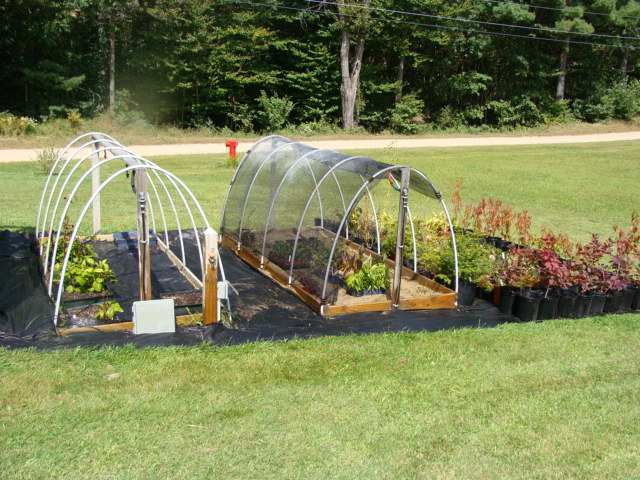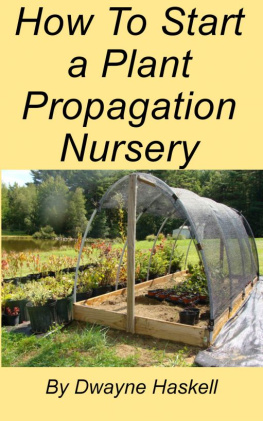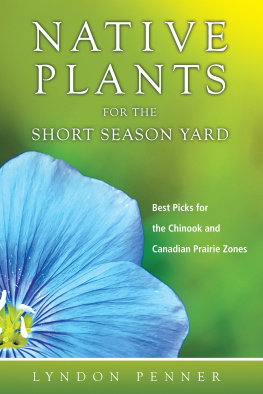How To Start A Plant Propagation Nursery
By Dwayne Haskell
Copyright 2013 Dwayne Haskell
Smashwords Edition
Smashwords Edition License Notes
This ebook is licensed for your personal enjoymentonly. This ebook may not be re-sold or given away to other people.If you would like to share this book with another person, pleasepurchase an additional copy for each recipient. If youre readingthis book and did not purchase it, or it was not purchased for yourenjoyment only, then please return to Smashwords.com or yourfavorite retailer and purchase your own copy. Thank you forrespecting the hard work of this author.
Table ofContents

Lets get this out of the way:
This Ebook will explain what you will need to startyour own plant propagation nursery. Because Cities and States havedifferent requirements when it comes to owning and operating anursery, this Ebook cannot possibly cover every scenario and isintended to give you some basic working knowledge that you can usewhen starting your own plant propagation nursery. Your individualresults may vary.
I have provided links to various products such asbooks and plant tags and some links to articles on other websitesor Wikipedia for more information if needed.
We allwant more of this, right?

What could be better than to make moneydoing something you love?
Starting your own home-based business is a veryrewarding experience. For those of us that love working withplants, it can be an even more rewarding experience. When we starta plant propagation business we get to create new plants from thosethat we already have, nurture then into a saleable plant that wecan sell for profit, and sell them to friends and neighbors. Evenstrangers that come to our plant sales become fast friends!
This Ebook is intended to give you the informationyou need to start your own plant propagation business off on theright foot. It is laid out in chronological order and you will bebetter served if you follow the steps as outlined. Basically what Iam saying is to not put the cart before the horse. Dont go out andget your business license or nursery license unless you actuallyhave something to sell. Also, dont buy something you really dontneed. Put the initial investment into gathering exactly what youneed to get started. Build as you go.
The first item you will need when starting your propagationbusiness is knowledge.
You need to have a basic understanding of whichplants will grow in your zone, how to care for them, and the bestmethod for propagating it. Without this basic knowledge, you willhave a tough time keeping your plants alive.
So where does someone get this knowledge? Surfing thenet, books, newsletters, PDFs, you name it, the knowledge iseverywhere. And that is the problem! Gathering this information canbe very time consuming. On top of that, if someone who does nothave real world experience growing and propagating the plant haswritten the information, you may be learning the wrong methods. Youreally don't want to be starting off gathering the wronginformation.
One of the best resources for plant propagation infois obviously Amazon. For instance, Michael Dirr's Manual of Woody Landscape Plants: TheirIdentification, Ornamental Characteristics, Culture, Propagationand Uses is one of the absolute best books you can buyand I recently saw 34 used copies for $33.00 each. That is a greatsavings over the price of a new copy!
Another great book is Hartmann and Kester's Plant Propagation: Principles and Practices(7th Edition) . Used copies were $25 less than the newones when I last looked! Start building your library and knowledgetoday!
How about free information about plantpropagation?
My motto is "If it is free, it is for me!" and I liveby it every day. There are some wonderful websites and newslettersdevoted to plant propagation. One of the best newsletters I havefound is at Freeplants.com. As well as the free newsletter, thereare some great articles right at the website that you can learn alot from.
Another great way of gaining knowledge for free isthrough PDFs and other reports that have been written by plantpropagators. For instance, DipNGrow has a nice free PDF available. DipNGrow is a rooting hormone that iswidely used by professional plant propagators with great results.DipNGrow is a concentrated liquid that you dilute depending on thetype of cutting you are rooting. Simply dilute it to theconcentration you need. Saves a ton of waste!
The PlantPropagation Misting System website has collectedhundreds of PDFs on plant propagation, misting systems, nurserymanagement, pests and diseases of plants, growing fruits andberries, as well as how to attract hummingbirds and butterflies. Ifyou want to access them, become a member! It is free and you getaccess to all the PDFs they have gathered to increase yourknowledge about running a plant propagation business. As well asthe PDFs, they have a list of websites to go to when you need togather information on various plant related subjects.
The second item needed to start a plant propagation businessis plants.
Not just any plants, but the exact plants you will betaking your cuttings from. At this point you need to decide whichbusiness you are actually in. Are you making cuttings and growingplants to sell to your friends, neighbors and relatives? If so, youwill be in the retail nursery business.
Are you going to sell the rooted cuttings or linersto other nurseries? Then you will be in the wholesale nurserybusiness.
Regardless of which business model you choose, youneed to start off on the right foot. Simple retail selling ofplants is the simplest of the two business models, but thewholesale model is where you can make the most money. Let's go overboth types of businesses so you can decide which is best foryou.
ATTENTION: If you think you may at some point sellany plants, cuttings, or plant material to another nursery, youmust begin with the wholesale nursery model!
Selling to the public: Retail
If you decide you are going to sell to the publiconly and never sell to another nursery, you have chosen the easiestof the two business models. When selling to the public only, you donot need to be as concerned with the exact plant material you aretaking cuttings from. As long as the plants you are taking thecuttings from are not patented you can take cuttings. If the planthas a trademarked name, you CANNOT sell the plant using that name,but must sell it as a species only. For instance, if you propagateBurning Bush CHICAGO FIRE, you cannot sell it as CHICAGO FIRE,you can only sell it as Burning Bush sp. (species). Trademarks arenames that the discoverer of the new plant has designated for thatplant and has registered for that particular plant. Usually it is aname that describes the plant so it is distinguished from otherplant of the same species.
Patented plants are a whole different ballgame. Neverpropagate a patented plant unless you have a written agreement withthe patent holder. If you do propagate a patented plant, you willbe liable for royalties that propagators pay for the privilege topropagate and sell the plant. If you are found to be propagatingpatented plants without the proper paperwork, you will still haveto pay the royalties and possibly be fined for propagating theplants without the paperwork. My advice: stay away from thepatented plants.
So now that you know that just about any nonpatentedplant is fair game, you can start to purchase plants topropagate.













